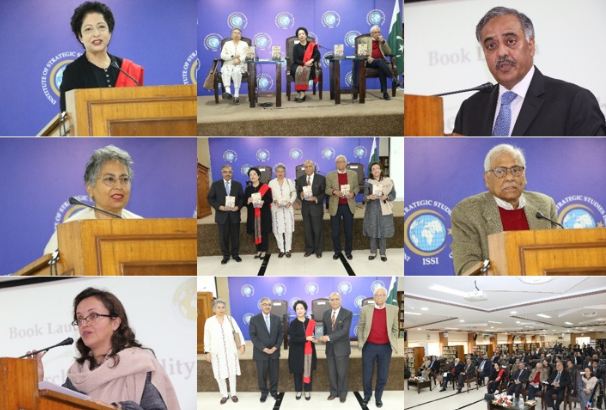Launch of Dr. Maleeha Lodhi’s book “Pakistan: Search for Stability” at ISSI

ISLAMABAD, MAY 4 /DNA/ – The Centre for Strategic Perspectives (CSP) at the Institute of Strategic Studies Islamabad (ISSI), organized launch of the book tiltled “Pakistan: Search for Stability”, edited by Dr. Maleeha Lodhi. Two other contributors to the book — Mr. Zahid Hussain, a prominent journalist; and Dr. Dushka Saiyid, a former professor of History at QAU — were also present. The event was attended by eminent members of foreign and civil services, academia, civil society, media, and the diplomatic corps in Islamabad.
During her initial remarks, Dr. Neelum Nigar, Director of CSP, underscored the importance of Dr. Lodhi’s book, which delves into the complexities of Pakistan’s policy formulation in its pursuit of stability. Dr. Nigar stated that this book has the potential to greatly enhance people’s understanding of the crucial subject-matter that it addresses.
In his welcoming address, DG ISSI Ambassador Sohail Mahmood highlighted Dr. Maleeha Lodhi’s extensive experience and valuable contributions to Pakistan throughout her long public career, including as an accomplished political scientist, journalist, and diplomat. He also commended the other 18 eminent contributors to the book, analysing Pakistan’s history, politics, economy, society and foreign relations from their respective academic, professional and practitioners’ viewpoint and proposing a practical way forward.
Ambassador Sohail Mahmood noted that Dr. Lodhi’s latest book builds upon her previous work and explores Pakistan’s pursuit of stability amidst its current challenges, outlining the requisite solutions as well as strategies. In essence, he said, the book carries a message of hope and optimism, reassuring that it is indeed possible to overcome the challenges and to be on the path of recovery and renewal. Rather than overwhelming readers with daunting obstacles, it serves as a reinforcement of self-belief and contains a call to decisive, achievable, and transformative action. Ambassador Sohail Mahmood further stressed that the book is a serious and non-partisan contribution to the policy discourse in Pakistan, serving as a valuable resource for policy-makers as they navigate the beginning of a new political cycle. The timing of its release is particularly opportune for learning and insight.
In her address, Dr. Lodhi emphasized the importance of seeking opportunities amidst crises. She noted that in Pakistan, political dynamics have yet to catch up with the socio-economic changes occurring in the country. Dr. Lodhi lauded all the contributors to the book, acknowledging their comprehensive set of policy guidelines covering a wide array of topics. Furthermore, Dr. Lodhi highlighted Pakistan’s youthful and highly talented demographic, expressing optimism about their potential to drive positive political change. However, she lamented that the governance structure remains entrenched in outdated thinking, and the situation marked by a number of political, social and structural fault-lines. The polarisation and absence of consensus, mutual respect and tolerance within Pakistan’s political system, she argued, contributes to destabilization.
Moreover, Dr. Lodhi pointed out the economic challenges facing Pakistan, including its entrapment in a debt cycle leading to increased inequality perpetuated by a minority elite’s control. She remarked that the book aims to chart a course towards overcoming the existing fault-lines within Pakistan’s system and needs to be read with care and attention by the policy circles.
Dr. Dushka Saiyid emphasized the importance of educating the younger generation about historical figures, particularly highlighting the life and teachings of Pakistan’s founder, Quaid-e-Azam Mohammed Ali Jinnah. In her talk, she navigated through historical contexts to emphasize the enduring relevance of Jinnah’s principles in shaping a progressive and united Pakistan for generations to come. She underscored Jinnah’s democratic, secular and inclusive principles as well as his emphasis on constitutionalism, education and women emancipation as essential for contemporary Pakistan, which she has elaborated upon in her chapter in the book.
Mr. Zahid Hussain stressed the necessity for policymakers to glean insights from historical precedent, which has often resulted in Pakistan facing persistent crises, whether in politics or economics. He noted that the internal security situation was further exacerbated by challenges such as climate change and population growth. Highlighting concerns at three of Pakistan’s four borders, he particularly emphasized the serious situation along the Pakistan-Afghanistan border. Mr. Hussain highlighted the spillover effects of the situation in Afghanistan, contributing to heightened insecurity in Pakistan, and advocated for a reassessment of Pakistan’s Afghan policy, a subject he has addressed at length in his chapter in the book.
Following the presentations, participants engaged in an interactive discussion. In the end, Ambassador Khalid Mahmood, Chairman of the Board of Governors, ISSI presented the Institute’s Shields to the speakers followed by a group photo.
Related News

‘King of reconciliation’: Bilawal says only Zardari can end political polarisation in country
ISLAMABAD, DEC 27: Pakistan Peoples Party (PPP) Chairman Bilawal Bhutto-Zardari has stressed the need forRead More

Naval Academy passes out 90 midshipmen and 34 SSC cadets
KARACHI, DEC 27 /DNA/ – The Commissioning Parade of 124ᵗʰ Midshipmen and 32ⁿᵈ Short ServiceRead More


Comments are Closed